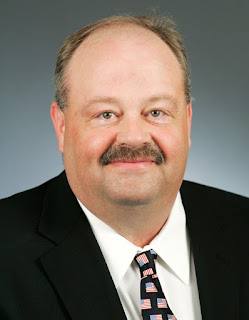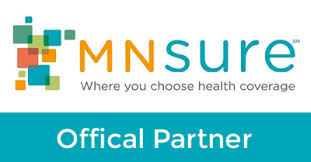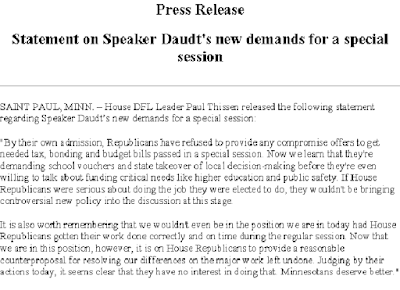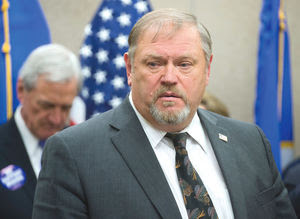Archive for the ‘David Hann’ Category
The politics surrounding the MNsure crisis took a bizarre turn yesterday when a politician stated that “It’s a real breakdown in the functioning of the Affordable Care Act”, then said “I take it very, very seriously. And I deplore it.” That politician wasn’t Speaker Daudt, though Daudt had some harsh words to say about MNsure.
The politician who said that the ACA was breaking down and that the letdown was deplorable was Gov. Dayton. Of course, Gov. Dayton didn’t propose a plan to fix the MNsure crisis. He left that responsibility to legislators. Whether he likes it or not, Gov. Dayton’s responsibility is that of being Minnesota’s CEO.
Thus far, Gov. Dayton hasn’t shown any leadership during this crisis. The good news is that Republicans, especially Speaker Daudt and Rep. Greg Davids, are trying to solve Minnesota’s health insurance crisis. Rep. Davids, the chair of the House Taxes Committee, pictured below, just updated Gov. Dayton, Sen. Bakk, Sen. Hann, Speaker Daudt and Rep. Paul Thissen on what he’s working on.
In Chairman Davids’ letter, he outlined his priorities rather succinctly, saying “We need fixes that will lower costs, help Minnesotans keep their doctors, and increase their choices.” Then he wrote this:
Lower Costs
Create an immediate tax credit that applies to Minnesotans who purchase health insurance both on and off the MNsure exchange that has eligibility beyond current federal subsidies to buy down premium costs. If even one Minnesotan can keep their doctor or find an affordable alternative, Governor Dayton should put the full force of his administration behind lobbying the federal government to allow access to credits off the exchange.
Amen to that, Chairman Davids. Finding solutions that let families keep their doctors and plans must be part of the long-term fix. Anything less is selling families short.
Then there’s this:
Keep Doctors
Create a tax credit to reduce out of-network-costs that arise from seeking care from a long-time primary care physician. Minnesotans were promised that if they liked their doctor they could keep their doctor, but too many are losing their long-time doctors due to narrow networks. Continuity of care needs to be addressed to ensure that we do not lose sight of the importance of actual health care when we look at the problems with health insurance coverage.
The ACA guarantees the right to buy insurance. Unfortunately, the accompanying high deductibles make health care unaffordable for too many families. Forcing families to buy insurance that they can’t afford to use is immoral. It shouldn’t be tolerated. If the DFL insists on tinkering around the edges of this failing system, Republicans in St. Paul and DC should remind the state and the nation that Republicans fought for solutions while Democrats fought for salvaging a failed ideology.
More Choices
Allow Minnesotans to purchase non-qualified health plans (QHPs), and seek a federal waiver to waive tax penalties for those who purchase a non-QHP insurance plan. If the federal government will not approve the waiver, Minnesota should provide a rebate to cover the cost of the non-QHP penalty.
A to the men, Chairman Davids. It’s time to tell the federal government that their plan is a total failure and that it’s time to do the right thing by American families. Once Minnesota’s system, which will be implemented thanks to Republican leadership, starts lowering costs and providing families more choice, the rest of the nation will copy Minnesota’s model.
Thus far, Gov. Dayton’s efforts have been halfhearted. It’s heartwarming to see Republicans like Speaker Daudt and Chairman Davids providing leadership in solving Minnesota’s health insurance and health care crises. It’s disheartening to see Gov. Dayton and the DFL essentially sitting on the sidelines and proposing tinker-around-the-edges non-solutions.
UPDATE: This is a copy of Chairman Davids’ letter:
Rep. Davids letter to Governor Dayton and Legislative Leaders by Minnesota House Republicans on Scribd
Technorati: Kurt Daudt, Greg Davids, House Taxes Committee, David Hann, Health Insurance, Insurance Premiums, Consumer Choice, Provider Networks, Affordability, Leadership, MNGOP, Mark Dayton, Tom Bakk, Tony Lourey, Affordable Care Act, Obamacare, MNsure, Ideology, DFL, Election 2016
In a stunning admission, Gov. Dayton admitted that the ACA isn’t affordable for many Minnesotans. It’s stunning that Gov. Dayton would say “Ultimately … the reality is the Affordable Care Act is no longer affordable for an increasing number of people. We’re going to need both state and federal governments to step in and do what they need to do to remedy these problems.”
It isn’t quite like FDR admitting that the New Deal was a failure or LBJ admitting that the Great Society is a failure but it isn’t that far from it in terms of its political impact. With DFL candidates campaigning across the state, this is like a neutron bomb detonating on their campaigns. Understanding the importance of Gov. Dayton’s statement, Senate Republicans pounced on Gov. Dayton’s statement, releasing this statement, saying “Senate Republicans today vowed to pass bold legislation to lower health insurance costs and make more options available to Minnesotans when they reconvene as the majority caucus in January. The announcement came three days after individual insurance rates increased by an average of 50-67%, and Minnesota became the first state to institute widespread caps on the number of new enrollees allowed to purchase plans. The situation has been described as a healthcare crisis for Minnesotans.”
Here are the things that Minnesota Republicans proposed:
To achieve lower premiums and deductibles:
- Restore a statewide high-risk pool (like the former Minnesota Comprehensive Health Association – MCHA) to make the individual market healthier, more sustainable, and less expensive.
- Allow a tax deduction for health insurance premiums for individuals and families who don’t qualify for group insurance.
To achieve more choices in the marketplace:
- Allow entities other than employers to offer group health insurance for their members. This would include organizations like agriculture cooperatives, fraternal organizations, clubs, etc.
- Allow all independent doctors, clinics, and hospitals to be considered in-network providers (as long as they meet the network qualifications).
To achieve a more efficient system:
- Allow individuals, families, and small employers to skip the hassles of MNsure by purchasing coverage directly through insurance agents, while still receiving the same tax credits available to MNsure enrollees.
- Allow Minnesotans to enroll in public health insurance programs like Medical Assistance through their counties instead of through MNsure by expanding County Based Purchasing.
Senate Minority Leader David Hann said this in the statement:
In the three and a half years since MNsure was created, insurance costs have shot through the roof, millions of taxpayer dollars were wasted on fraudulent applications, hundreds of thousands of families lost their doctors, and enrollment obstacles have delayed cancer treatments, even costing one woman her life. Despite all of this, Democrats in the legislature haven’t lifted a finger to fix it, or even stop MNsure executives from receiving thousands in unfair bonuses. Minnesotans need to decide: Do you want more of the same top-down regulations that caused this mess? Or do you want to lower costs and increase choices by tailoring the health insurance market to individual needs? Republicans will bring our health insurance market back from the brink of collapse by instituting patient-centered, common sense reforms.
The DFL created this crisis. Dayton administration Commerce Commissioner Mike Rothman characterized the situation this way:
These are middle-class Minnesotans. They are getting squeezed — crushed — by these health insurance costs.
That’s right. They’re getting crushed by the things that the DFL voted for. Republicans offered lots of amendments to the bill but each was defeated by the DFL on straight party line votes. During the 2015 and 2016 sessions, Republicans offered alternatives but the DFL Senate consistently stopped the Republicans’ legislation.
I’ll word it differently than Sen. Hann. If Minnesotans want high premium increases, they should maintain the status quo in the legislature. If Minnesotans want real reform and lower health insurance premiums, their only option is to vote for Republicans.
Technorati: MNsure, Mark Dayton, Mike Rothman, Obamacare, New Deal, Great Society, DFL, MCHA, David Hann, Health Care Reform, County-Based Insurance, Individual Markets, Republicans, Election 2016
As usual, Rep. Paul Thissen is criticizing Republicans for the DFL’s mistakes. The DFL created MNsure without a vote from Republicans. Republicans offered amendments to the MNsure bill but those amendments were rejected by the DFL because Rep. Thissen wasn’t interested in doing what’s right. Rep. Thissen was just interested in winning partisan victories.
Now that MNsure is an unmitigated disaster, Rep. Thissen is blaming Republicans for the DFL’s mistakes, saying “Republicans have a pattern of waiting until the last minute and then trying to say ‘Oh man, we have an emergency and we need to solve it.’ That’s what they’re doing again. Where have you been for two years?”
That’s what I expect from Rep. Thissen. The DFL created a disaster while he was Speaker, Tom Bakk was the Senate Majority Leader and Mark Dayton was the governor because they wanted the big victory for President Obama. It blew up from the start. In Rep. Thissen’s thinking, it’s Republicans’ fault for not saving the DFL from the DFL’s policy disasters. Harold Hamilton sized things up perfectly with this:
Recall that Governor Dayton and DFL own this debacle lock, stock, and barrel. They created this mess without a single GOP vote. Of course, that hasn’t stopped DFL politicians from trying to pin blame on Republicans. This finger pointing comes in the form of demanding that the GOP help the DFL get out of the mess and find solutions to their problem. This is typical, expected, and emblematic of the shameless nature of their politics.
DFLers set fire to some issue, and then jump up and down demanding that the GOP play fireman (fire person?) and douse the flames. It’s all part of the deflection of the issue. This all follows a familiar pattern:
- First, DFL identifies some issue as being in need of a government solution.
- Two, DFL creates policy that makes situation worse.
- Three, DFL blames some boogie man (e.g. Big Insurance Companies) and demands GOP fix problem.
- Four, DFL uses the we-care-about-people-so-our-results-don’t-matter excuse.
- Five, GOP fixes problem. Or if they don’t, DFL blames GOP for not caring and not having a solution.
Needless to say, the GOP has solutions, and has had solutions. The House and Senate GOP should go through the record and tally the number of amendments that were offered by their members in all committees and on both floors. Amendments were offered by the GOP. The DFL rejected them. Now, the DFL wants GOP ownership of their problem.This video highlights the MNsure disaster:
Pay particular attention to Sen. Julie Rosen’s presentation 10 minutes into the presentation. It’s totally infuriating. If you aren’t upset with the DFL after watching that, then you don’t have a pulse.
Putting this bluntly, the DFL is the party of failure. The DFL didn’t support the Sandpiper Pipeline project. Instead of providing high-paying jobs to Minnesotans, the DFL pushed those high-paying jobs away to North and South Dakota, Iowa and Illinois. Three years ago, the DFL created MNsure. Now it’s a disaster. That’s the same year that they made an historic investment in K-12 education that would keep property taxes low. I’ve written frequently how that historic investment failed, too. Property taxes are still going up.
If you want failed policies in the future, vote DFL this year. That’s the DFL’s specialty. If you want things fixed or done right the first time, then voting for Republicans is the taxpayers’ only option.
Technorati: Paul Thissen, Tom Bakk, Mark Dayton, MNsure, DFL, MCHA, High Risk Pool, Julie Rosen, David Hann, MNGOP, Election 2016
When it comes to dishonest DFL politicians, Paul Thissen is in the conversation. Though he isn’t at the top of the list, he’s certainly part of the conversation. Yesterday, Rep. Thissen issued this statement. To be fair to Rep. Thissen, there were fragments of truth in his statement.
For instance, Rep. Thissen was sort of right in saying “Republicans have refused to provide any compromise offers to get needed tax, bonding and budget bills passed in a special session.” I say sort of right because they’re sticking with the House bill, which included lots of DFL priorities in it. I wrote this article to highlight the amount of compromise included in the House bonding/transportation bill. I included a lengthy quote from Sen. David Hann in the article. He was clearly and justifiably upset with Gov. Dayton’s refusal to drop any of his demands. Here’s what Sen. Hann said:
I would just reiterate that the bills that we had on the last day of session were compromise bills. Go back again. Look at the tape. Look at Sen. Stumpf talking about the bonding/transportation bill. He called it a “true compromise between Republicans and Democrats.” The Speaker has pointed out that half of that bill, more than half of it, had the Governor’s priorities in it. And now we’re supposedly at a point where all of those compromises are off the table and we’ve got another $243,000,000 of additional spending that we are being asked to do without any backing away from that number — an additional couple hundred million in bonding.
And all of this is kind of in complete denial of all of the compromise work that had gone on this entire last session. This is what I find so remarkable. I think it is a setback. Why, after a whole session and actually going back to the session before of talking about some of these issues, to now have a bill get killed at the last minute with a request for a light rail project that no one had ever seen a hearing on and now, that becomes a must have and they say we have to start over and renegotiate everything, I think it is a setback.
Rep. Thissen, why should Republicans offer additional compromises when Gov. Dayton refuses to move a square centimeter from his post-session positions? Rep. Thissen apparently thinks that Republicans should always compromise and that DFL politicians don’t ever have to compromise.
Later in his statement, Rep. Thissen said “If House Republicans were serious about doing the job they were elected to do, they wouldn’t be bringing controversial new policy into the discussion at this stage.” That’s rich. The only reason we’re in this position is because a handful of DFL senators amended the House bonding/transportation bill with less than 10 minutes left in the session to include a provision for funding for the Southwest Light Rail project. That provision was controversial. It wasn’t discussed in any House or Senate committee hearings. As Sen. Hann points out, “now it becomes a must have and we have to start over and renegotiate everything.”
It’s time Speaker Daudt and Sen. Hann turned up the heat on Gov. Dayton for killing the Tax Bill, then refusing the legislature to fix it. Gov. Dayton said he wouldn’t hold the Tax Bill hostage. I guess he meant he wouldn’t hold it hostage until he started using it as leverage in negotiations. Here’s why that’s important.
Gov. Dayton wants to increase the size of the bonding bill by more than 40% over the House bonding/transportation bill. Further, he wants $243,000,000 worth of additional spending for the Twin Cities added to a new supplemental appropriations bill after signing a major supplemental appropriations bill a month ago.
In other words, Gov. Dayton is insisting on getting everything he’s wanted from the start of the regular session. Republicans need to expose him for the autocrat that he is. Similarly, they need to expose the DFL as the party who hasn’t negotiated in good faith and that aren’t interested in doing what’s right for Minnesotans. Here’s Rep. Thissen’s statement:
Technorati: Paul Thissen, Mark Dayton, Autocrat, Bad Faith Negotiations, Southwest Light Rail, Supplemental Spending Bill, Twin Cities, DFL, Bonding/Transportation Bill, Tax Bill, Bipartisanship, David Hann, Kurt Daudt, MNGOP
The SC Times Editorial Board isn’t as unflinchingly liberal as the Strib’s Editorial Board but it’s a close second in Minnesota. This editorial isn’t the worst that they’ve published but it’s still a cheerleading editorial.
For instance, this editorial says “Earlier, the Times Editorial Board gave this advice to Gov. Mark Dayton: Don’t call a special session. Make the lawmakers deal with the consequences of failing to find agreement on some major legislation.” Clearly, the Times Editorial Board is picking Gov. Dayton’s side. It’s as if they’re absolving him of any responsibility for the trainwreck.
Gov. Dayton isn’t innocent in all this. He’s the idiot that vetoed the Tax Bill that would’ve provided tax relief to small businesses, farmers, students with crushing student loan debt, parents trying to save for their kids’ college education and military veterans. Is the Times Editorial Board cheering this disastrous decision? That’s what it looks like.
Dayton’s glum status report: “We’re moving backward.”
Gov. Dayton ought to know. He’s the politician who’s moving things backwards. During the session, he signed a supplemental spending bill. It wasn’t for nearly the amount that he’d originally wanted. Gov. Dayton is now insisting that a special session won’t be called until Speaker Daudt agrees to give him the rest of his spending request.
Thankfully, Speaker Daudt rejected that demand. Meanwhile, the Times apparently doesn’t care that hard-working blue collar people have gotten deprived of tax relief thanks to the actions of a spoiled trust fund liberal. Listen to Sen. Hann’s opening statement in this video. It’s quite compelling:
Dayton’s limousine liberalism and his my-way-or-the-highway negotiating style sends the clear message that he puts his ideology ahead of doing the right thing for Minnesotans. Lumped in with that is the DFL itself.
Sen. Hann noted the bipartisan nature of the bonding/transportation bill. Now Gov. Dayton wants to essentially start over and include all of his priorities while refusing to accept Republicans’ proposals. That’s what obstructionist liberalism looks like.
Let’s be clear. If Sen. Bakk were a profile in courage, he’d break with Gov. Dayton and insist that Gov. Dayton call a special session to fix the Tax Bill. The fact that he’s stayed silent says everything.
Finally, why has Gov. Dayton and the DFL insisted on a bonding bill that funds Southwest Light Rail? Twin Cities progressives insist that it’s needed. They’ve never explained why it’s needed. That hasn’t mattered to the Times. Like an obedient puppy, they’ve refrained from asking important questions. That isn’t surprising, especially considering the Times’ puppy dog reputation.
Technorati: St. Cloud Times, Liberal Media Bias, Mark Dayton, Tom Bakk, SWLRT, Special Session, Special Interests, DFL, Kurt Daudt, Farmers, Small Business, Tax Relief, MNGOP, Election 2016
When this year’s legislative session ended, the CW was that the DFL held the upper hand in the PR/campaign fight. Whether that was true or not at the time isn’t relevant anymore. What’s relevant is who’s fought the smartest fight to this point. This statement hammers home some important points.
In total, it says “House Republicans did their job this year, negotiated in good faith and passed bipartisan bills on the priorities most important to Minnesotans. Unfortunately, Senate Democrats and Gov. Dayton deliberately obstructed progress. First, Senate Democrats blocked funding for transportation and infrastructure, then Governor Dayton vetoed tax relief for working families, college students, parents, farmers, and veterans. If Gov. Dayton knew he was going to veto the tax bill, he should have done it a long time ago and called a special session right away. Now the election is ramping up and the political environment will get in the way of honest compromises. We are willing to hold a special session. We agree with Gov. Dayton’s requests in the tax relief bill, and we should pass the bipartisan compromise transportation and infrastructure bill that was agreed to on the last day of session. We are not going to rehash the whole session by repeating negotiations on half a billion dollars of new spending demands.”
The DFL has talked solely about process, talking about the end of session. Republicans have talked about Gov. Dayton vetoing the Tax Bill, then questioning why Gov. Dayton decided to hurt veterans, farmers, college students, parents saving for their kids’ college education and small businesses.
I won’t say that people don’t care about process. If I were a betting man, though, I’d bet that people care more about getting tax relief. If the DFL thinks that they’re winning that fight, I hope they keep thinking that.
The DFL is also highlighting the line ‘If the Twin Cities wants to raise the money to build SWLRT, they should be able to.’ I’d agree to that statement only if the DFL agreed that the metro also paid for the annual operating deficits, too.
The DFL needs to pick up seats in exurban and rural Minnesota. Arguing that tax relief for farmers, veterans and small businesses hinges on a metro project is exceptional stupid politics on the DFL’s part.
Technorati: Mark Dayton, Southwest Light Rail Transit, Pocket Veto, Special Session, DFL, David Hann, Tax Bill, Small Business, Property Tax Relief, Farmers, Veterans, Income Tax, MNGOP, Election 2016
There’s an important question Minnesotans should ask themselves before they head to the polls this November. Should they vote for a political party that’s owned by the special interests? If they don’t want to vote for a political party that’s owned by the special interests, then they can’t vote for DFL candidates.
The child care unionization vote provides the perfect illustration of how much the DFL is owned by the special interests. On May 15, 2013, the Minnesota Senate debated the child care unionization bill for 17 hours. The bill passed 35-32, with 4 DFL senators joining all 28 Republicans in voting against the forced unionization legislation. Five days later, on May 20, 2013, the House passed the unionization bill 68-66.
The DFL passed the bill despite a strong self-organized marathon lobbying effort by the in-home child care providers. When the DFL took up the debate in the House of Representatives, in-home child care providers were legion in the halls outside the House chamber. Repeatedly, these child care providers told the few DFL legislators who would listen that they’d reject unionization.
That didn’t matter to the DFL. Mike Nelson, the DFL’s point person on all things unions, argued for passage of the bill. The DFL passed the bill by the narrowest of margins, 68-66.
Rather than listen to the people, the DFL listened to the special interests. The bill passed. The DFL bragged about another legislative victory to go along with raising taxes and making historic investments in schools.
The DFL’s victories were short-lived. Several of the taxes that they raised were repealed 9 months later. The “historic investments” in education were touted as a way to stop property tax increases. Less than a year later, school districts were raising property taxes to sustain their operating levies.
On March 1, 2016, in-home child care providers pounded the final nail in the DFL’s forced unionization plans, defeating the organizing effort with 1,014 child care providers voting against unionization and 392 child care providers voting for unionization. In-home child care providers rejected unionization by a 72%-28% margin. That didn’t surprise Jennifer Parrish:
We know that over the 10 years that we’ve been working on this that child-care providers are hands down overwhelmingly opposed to this. They were waiting by their mailboxes just so they could have an opportunity to vote no. Family child-care providers are small business owners. We set our own rates, we create our own working conditions, all the things that unions typically negotiate for, we determine for ourselves.
The DFL listened to the SEIU and AFSCME. Republicans listened to in-home child care providers. Remember that the next time you wonder which party to vote for.
Technorati: Mark Dayton, Tom Bakk, Paul Thissen, Mike Nelson, AFSCME, SEIU, Forced Unionization, Special Interests, DFL, David Hann, Mary Franson, In-Home Child Care Providers, MNGOP, Election 2016
David Hann’s op-ed about DFL opposition to the bonding bill is hard-hitting and to the point. The opening paragraph to Sen. Hann’s op-ed says “It’s no secret why the bonding and transportation funding bills failed on the last day of the session: Senate Democrats, including Sen. Rod Skoe, tried to add a last minute amendment to pay for light rail transit in Minneapolis, breaking a deal made by legislative leaders. One of Rod Skoe’s DFL colleagues confirmed this doomsday strategy in a Twitter message sent moments after the session collapsed saying ‘No light rail funding, no bonding bill. When will the House figure this out?'”
Let’s remember that SWLRT funding has been controversial for as long as I’ve been paying attention to the state legislature. It’s a priority for transportation lobbyists but it isn’t a high priority for anyone else.
Sen. Hann closed his op-ed strong, saying “Rod Skoe will have to answer for failing to pass a long-term transportation package in the face of a $900 million surplus. Skoe will also have to answer why he chose light rail transit in Minneapolis over these important transportation projects.”
SWLRT isn’t a priority. Fixing Highway 12 isn’t a high priority either. Fixing Highway 12 is a super-high priority project. If Sen. Skoe wants to explain why he voted for funding SWLRT but didn’t fight for important projects, I can’t wait to hear his explanation. For some reason, I’m picturing Sen. Skoe doing lots of tap-dancing during his explanation.
Technorati: Rod Skoe, Southwest Light Rail, DFL, David Hann, Highway 12, Transportation, Bonding Bill, MNGOP, Election 2014
The latest scuttlebutt from St. Paul is that Gov. Dayton will veto the bipartisan tax bill by not signing it into law. Technically, he will use a provision known as a pocket veto. In the real world, it’ll be another example of Gov. Dayton overplaying his hand. When Gov. Dayton vetoes the bipartisan tax bill, he will argue that there’s a wording error in the bill’s language. Technically, that’s true. It’s also a dodge.
As this article says, this happens all the time. The article says “Those type of language errors happen all the time and are most often fixed by the Office of Revisor of Statutes, rather than requiring legislative action” before saying “Governor, this has all happened before — with DFLers and Republicans — on other issues. And there is no disagreement on the need for change in the language. … Governor, let the hostage bill go.”
Let’s be clear about this. Gov. Dayton plans on vetoing a bill with tons of middle class tax cuts in it, property tax relief for small businesses and farmers and that some tax incentives that will diversify the Iron Range’s economy. He’s threatening to veto the bill if House Republicans don’t agree to include funding for the Southwest Light Rail in the bonding bill, something that they’ve opposed for years.
Gov. Dayton initially said that he wouldn’t hold the tax bill hostage to get leverage on a bonding bill. Now he’s reneged on that promise. While I’m upset from a policy perspective that Gov. Dayton plans on vetoing the tax cuts, I’m thankful he’s doing it from a political standpoint. Let me explain.
Gov. Dayton has undoubtedly read the articles saying he has the most leverage over a special session. While that’s true in the sense that he’s the only person who can call a session, it isn’t true in the sense that the GOP put together some very appealing legislation. The tax bill is a perfect example. That passed with overwhelming support in the House and Senate. It passed in the House 123-10. It passed in the Senate 55-12.
Further, on the bonding bill, Gov. Dayton and the DFL are essentially saying that funding for the SWLRT is more important than fixing Highway 12, the most dangerous stretch of highway in Minnesota. Does the DFL really want mailers showing up telling stories about traffic deaths that they voted against. See here, here and here for stories about fatalities on Highway 12.
Those mailers will be especially effective against DFL senators because they voted to stop funding for fixing Highway 12. Picture a mailer showing up in Terri Bonoff’s open seat in Plymouth that highlights her support for SWLRT at the expense of fixing Highway 12. Imagine that mailer showing up in Chris Eaton’s Brooklyn Park/Brooklyn Center district. I can’t imagine this playing well in John Hoffman’s district or in Alice Johnson’s district, either.
If Gov. Dayton wants to bet that funding SWLRT is more popular than middle class tax cuts or fixing Highway 12, it’s my advice that Speaker Daudt and Sen. Hann should call his bluff. I’m betting that DFL legislators in swing districts won’t like Gov. Dayton playing hardball with those issues.
Technorati: Mark Dayton, Pocket Veto, Southwest Light Rail, Highway 12, Transportation, DFL, Kurt Daudt, David Hann, Middle Class Tax Cuts, MNGOP, Election 2016
Last week, Senate Minority Leader David Hann wrote Senate Majority Leader Tom Bakk a letter requesting that Sen. Bakk release the content of a threatening email Sen. Bakk sent to Cook County businessman Dennis Rysdahl. Predictably, Sen. Bakk refused to release that email, saying “You just can’t do that.”
After hearing Mr. Rysdahl’s testimony and reading his quote in the DNT’s article, I’d argue that it’s imperative that Sen. Bakk’s email be made public. Rysdahl testified at Cook County’s County Commissioners meeting, saying “I got an email from Tom Bakk yesterday, and he’s very concerned. He’s already hearing, again, what’s he’s heard many times before that Cook County doesn’t really belong in the Taconite Relief District, and if they’re going to take an action like this, they don’t deserve to continue to be involved.”
After reading that quote, it’s insulting that we read this opening paragraph of the Mesabi Daily News article:
Senate Majority Leader Tom Bakk of Cook will not acquiesce to a Republican request to make public a personal email sent to a Cook County businessman regarding the Twin Metals lease issue.
That’s BS. First, I’d demand to know which email address Sen. Bakk used. If he used his legislative email address or his IRRRB email address, that ends Sen. Bakk’s argument that it’s a personal email. Saying that you’re using a government account to send personal emails is a nonstarter.
Further, I’d argue that any email that talked about potential action by an executive branch agency isn’t personal. Based on Mr. Rysdahl’s testimony, it sounds like the email relates directly to Sen. Bakk’s responsibilities as a member of the IRRRB executive board. This paragraph indicates that the email was official:
But in Cook County, there is also an undercurrent of an Iron Range Resources & Rehabilitation Board issue — should Cook County continue as part of the Taconite Relief Area and receive agency funding.
I can’t wait to hear Sen. Bakk explain how threatening the Cook County commissioners with cutting off funding is “personal.” As I said earlier, I don’t doubt that Sen. Bakk wanted to keep his threatening email private.
I hope that Sen. Hann has another plan to force Sen. Bakk into producing that email. Private citizens shouldn’t have to deal with threats from public officials. That’s what Sen. Bakk did to Mr. Rysdahl and to the Cook County commissioners.
Technorati: Tom Bakk, IRRRB, Cook County Commissioners, Taconite Relief Area, Dennis Rysdahl, Minnesota Data Practices Act, Executive Board, DFL, David Hann, Accountability






